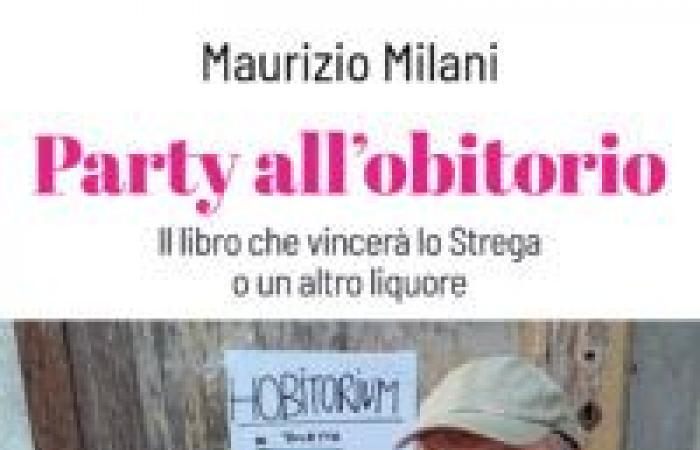Maurizio Milani’s humor at the edge of reality (almost always largely outdated) is back in bookstores.
It’s a Milani in great shape, that of Party at the morgue, his new editorial effort in bookstores from June 26th Aliberti publisher. “The book that will win the Strega or some other liqueur”, reads the cover. If it happened, you can be sure that the author would celebrate properly: putting a sparkling wine in the coffin, to continue toasting even on the last journey, as he suggests to readers in a manifesto sentence of the book. We knew that black humor was congenial to Milani. But where does this decidedly “sepulchral” inspiration come from now? “There is one thing to say,” explained the cabaret artist-writer who was one of the cornerstones of Zelig’s successful season. “The salary of cemetery caretakers has not been adjusted because the unions do not look favorably on mortuary workers. We don’t know why, they do it on purpose not to renew the employment contracts, which have been in place since ’74 and are equal to the other custodians, including the bioethical bank”.
In reality, Milani’s intent in this book is decidedly serious and also ambitious: to tell about death in a fun way, as if it were a hymn to life. “The funeral of Joyce’s Ulysses,” explains Milani, “is on June 18th, Bloom Day. In Ireland it is celebrated in the pubs. And in my book c‘It’s a chapter on James Joyce’s funeral… It’s just that the funeral always makes you laugh, in reality, and it’s a very embarrassing thing: you don’t know what to say, you can’t laugh, unless the deceased has left the saying “laugh like crazy”, with the risk of offending the relatives. ”.
In exclusive preview for Il Fatto Quotidiano we anticipate an excerpt taken from the interview-preface by Francesco Aliberti with Maurizio Milani.
 Carlo, why a party in the morgue?
Carlo, why a party in the morgue?
I was very struck by an article in the «Corriere della Sera», not long ago, about Evita Perón, the lay saint of Argentina, Perón’s wife. It seems she was buried in the main cemetery of Milan under a false name and she rested there for eleven years. Her discovery came about by interviewing the funeral home driver who was in charge of transporting her body. Perón had fallen out of favor, and the faithful Peronists had hidden Evita’s body to avoid the pilgrimage of her followers. The Peronists made an agreement with Perón’s faithful, with the Vatican, to take her to Italy and practically – stuffed in a bag – they took her to the main cemetery in Milan. Pit number, even camp number, all under an assumed name.
When Gualtieri went to government, which is another pro-Peronist dictator – I’ll tell you the story now because the joke is at the end – they wanted the body back and the exhumers were astonished when they picked up this woman: she was intact, as she had been embalmed . On her grave there was the name Elena Galli. But the exhumers knew, in Argentina it is tradition to embalm people.
To make a long story short, Evita Perón, who remained for eleven years in the main cemetery of Milan, where I often go because I have relatives, was transported – I’ll send you the link to the article later – to Spain, where Franco, Francisco were still there Frank. And here is the story of this funeral home driver, my uncle, who was in charge of bringing Evita Perón (this is the joke).
He was your uncle.
My dad’s brother, the story is all true.
There is a familiar fact, in fact here you imagine the protagonist to be the morgue caretaker.
Yes, morgue caretaker. In our family we also had several people under false names who in reality were great dictators, great politicians, statesmen. Mussolini himself, you know, was buried under a false name, again in the Musocco cemetery in Milan, and his body was stolen by a certain Leccisi. At night he entered the cemetery, think about it – the Milan cemetery is immense, a hundred hectares in size. He practically exhumed the body and took it away. As a sign of gratitude, the fascists made him a senator of the Social Movement after the Constituent Assembly. Afterwards there was a negotiation with De Gasperi and the body was given to Rachele Mussolini’s family. The body is still in Predappio, her hometown. You know there are pilgrimages…
Of course not.
But he, after the autopsy, after Piazzale Loreto, was buried for the pilgrimages of those of the Social Republic, at Musocco. He also thinks like Evita Perón, thirty years before clearly, in ’45, and under a false name.
This one found out, this, let’s say, unredeemed, this unredeemed fascist, where he was. The body had been placed in a perfectly normal hole under the name of Antonio Bianchi. It was also necessary to know where to dig and he knew everything and he did it, at night, with other accomplices. There are black and white reconstructions from 1956 published in «Oggi».
That story caused quite a stir, I don’t know if you have elderly relatives, uncles who are, let’s say, eighty years old, that stuff. The theft of Benito Mussolini’s body caused a sensation as it could be now, that is, I’m not saying Falcone and Borsellino, but it was something that all the newspapers were talking about. Then it wasn’t like now, there was «Oggi», «Gente», there was the radio, there was no TV. I’ve always liked to dedicate myself to, you know, exasperated Quentin Tarantino-style stuff, which becomes like a cartoon. For me, pulp, the cannibals of ’92, Ammaniti, that genre, I always liked to convert it into comedy, it fascinated me.
You chose to talk about death, but in a fun way, as if it were a hymn to life.
Certain. The funeral of Joyce’s Ulysses is on June 18th, Bloom Day. In Ireland it is celebrated in the pubs. There is a chapter on James Joyce’s funeral… Funerals always make you laugh, I also remember booklets like “one hundred things not to do at a funeral”. Going to a funeral is very embarrassing, because what do you say, you don’t know what to say, you can’t laugh, unless the deceased has left a saying “laugh like crazy”, with the risk of offending the relatives. It’s not simple, if I – who am an idiot – leave something written in my will like “laugh, joke and throw my body on the ground”, and then my relatives say: “No, what are you doing!”, and the others: «No, but he had said to do so», «Yes but if he was the idiot, it’s not like we’re throwing the body into the Po, because he had said to throw the body into the Po. We as relatives are against it, no, not you can offend, we are appealing, even if these were the intentions, they are intentions of crime, you cannot say that you throw the body into the Lambro”.
Of all the stories, which one did you have the most fun writing?
The story that amused me the most, which I wrote after sending the entire package to be transcribed, is this: the Milan morgue is twinned with Bora Bora, the morgue of Bora Bora. There, you know, in the archipelago that caused the mutiny, a similar thing happened: the mortuary workers from Bora Bora came to Milan to visit, when the morgue workers from Milan went to Bora Bora they no longer wanted to come back. Why? Because almost no one ever dies there, it’s not like in Milan. In Bora Bora one or two people die a year, so they have nothing to do, they are at the seaside all day, they eat shellfish and they did like the Bounty, like the mutineers on the Bounty, that famous Marlon Brando film. So I liked that fact of the twinning, due to which there are no longer any morgues in Milan, which I don’t know if this term is relevant either.
Obitorist is a neologism, right? You made it up.
Yes, it is. In my experience, those who are put in the ASL mortuary are the ones who cause trouble and go to work drunk – I found one, there at Baggina, who was a friend of mine. He had started reading books on gender identity, he had gotten it into his head that he was a pederast, but he wasn’t a pederast. He started going to the traditional library to read Freud’s university texts, huge volumes. He had gotten it into his head that he had pederasty, and he had let himself go. He was disappointed, he had lost self-esteem. He was an OB, at Baggina, he was a paramedic, he had started drinking. They changed his ward, but he couldn’t stay there because he smelled of wine, the patients and their relatives complained, and they moved him to the mortuary.
Same thing in Codogno: there was a big drunk, this time an employee of the local health authority, who became an morgue attendant as an “undead caretaker”. He is there, among the deceased, sitting behind a table and keeping watch. He has the task of making sure that the customers don’t come to do stupid things, like taking away the bodies, in short. But this almost never happens.
I think this book will have a lot of readers among the morgue keepers. They will all buy it, right?
Oh yes, but you know, they also give the morgue caretakers a house above the morgue. Before it was even a must. Now, you know, with highly educated people, the morgue attendant’s children are joked about in high school, because they tell them: “Ah, cool, you live above the morgue.” You know, the girl feels bad. While once upon a time, when they didn’t go to school, they barely finished fifth grade, the mortuary worker lived above the morgue, you had the right to the house. With very high levels of education, it happens that children say: “Dad, everyone jokes with me because we live above the morgue.” So they go and get a terraced house on the outskirts. And above the morgue they created a first reception center. That is, no, they put those who are waiting for permission. And, you know, they make food there. The house is not that big, it is eighty square meters. They put those kids there, who come from Africa. And nothing. They don’t go into the morgue because there’s an outside entrance, right? So you see the relatives, then you see these ones here, the half-naked ones going up. Bare back. Because you know, I’m usually barebacked.
“What the fuck is here?” ask the relatives of the deceased.
“This is a reception centre, we are waiting for the residence permit from the police headquarters.”
“But that’s not the fucking way anyway. Here there is a moment of reflection.”
Oh well, nothing, they don’t do anything. They pass through the external staircase, come in here to offer condolences and they don’t know the deceased. I mean, what do you want? The relatives complain that they see these people going upstairs, over there, from the external staircase.
But the man from Pompe defends them and says: «They have the right to be here because the prefecture sent them here. You have the deceased, no one disrespects him. Right? We should accept recollection on their part.”
«But they, they fucking have relatives in Africa!»
As an obituary doctor I say: «I agree with certain things about globalism. But in this case they are right. They should wear a t-shirt, at least for public decorum, or a tie.”
«But what a tie, they don’t have to come to the funeral!»
“Well, let them come to the funeral too.”
“But no, but they didn’t know the deceased.”
“Well, but they have nothing to do all day.”
Magnificent.
Eh, I improvised it like this.







